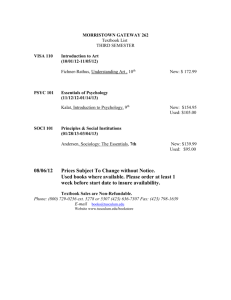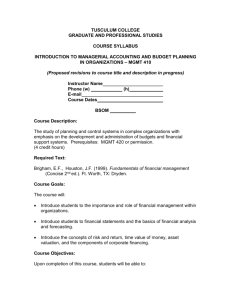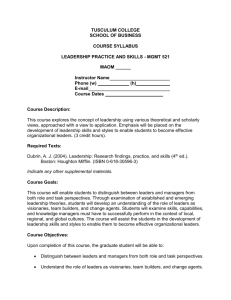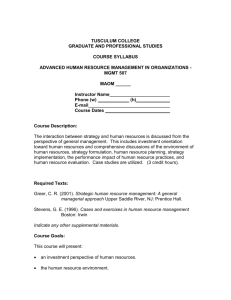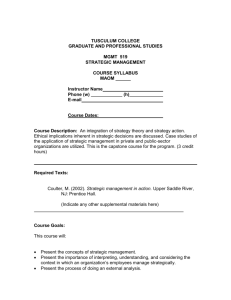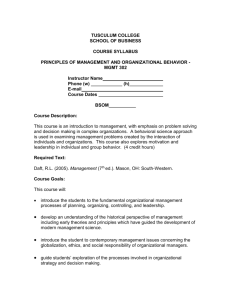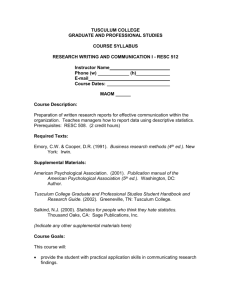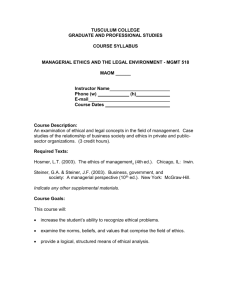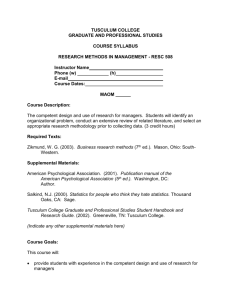MGMT 302: Principles of Management & Organizational Behavior
advertisement
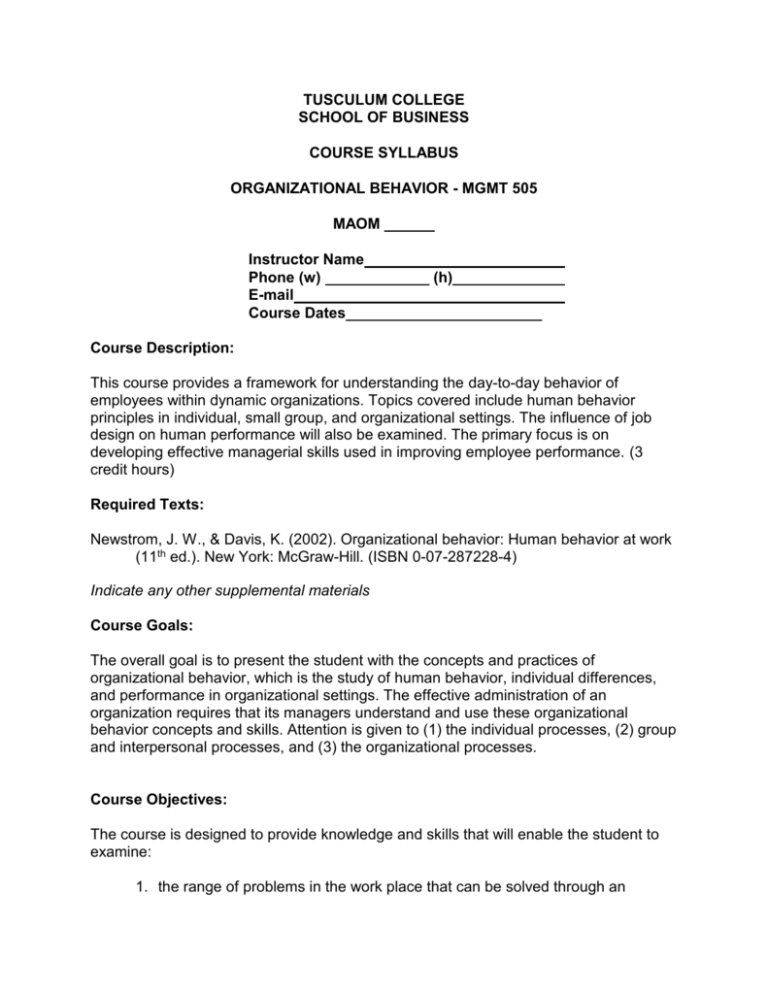
TUSCULUM COLLEGE SCHOOL OF BUSINESS COURSE SYLLABUS ORGANIZATIONAL BEHAVIOR - MGMT 505 MAOM ______ Instructor Name Phone (w) E-mail Course Dates (h) Course Description: This course provides a framework for understanding the day-to-day behavior of employees within dynamic organizations. Topics covered include human behavior principles in individual, small group, and organizational settings. The influence of job design on human performance will also be examined. The primary focus is on developing effective managerial skills used in improving employee performance. (3 credit hours) Required Texts: Newstrom, J. W., & Davis, K. (2002). Organizational behavior: Human behavior at work (11th ed.). New York: McGraw-Hill. (ISBN 0-07-287228-4) Indicate any other supplemental materials Course Goals: The overall goal is to present the student with the concepts and practices of organizational behavior, which is the study of human behavior, individual differences, and performance in organizational settings. The effective administration of an organization requires that its managers understand and use these organizational behavior concepts and skills. Attention is given to (1) the individual processes, (2) group and interpersonal processes, and (3) the organizational processes. Course Objectives: The course is designed to provide knowledge and skills that will enable the student to examine: 1. the range of problems in the work place that can be solved through an 2 understanding of employee behavior. 2. the organizational culture and how it is controlled by both external forces (e.g., laws, litigation, federal guidelines) and internal components (e.g., employee characteristics, management style). 3. principles of group interaction and its effect on organizational functioning, including both employee job satisfaction and productivity. 4. different management styles and their effect on employee behavior. 5. the multi-faceted nature of administrative effectiveness. Advanced Competencies: The five Advanced Competencies must be addressed in the course. The Advanced Competencies are: 1. Critical Thinking—narrowing of focus, sorting ideas generated, identifying the most reasonable ones. This involves recognizing opinions vs. facts, being honest with oneself, resisting manipulation, overcoming confusion, asking questions, acknowledging complexity, finding connections between subjects, and being intellectually independent. 2. Synthesis of Information—taking independent bits of information, understanding their relevance, and bringing them together into a meaningful order. 3. Problem Solving—defining the problem, thinking about problem is both narrowed and expanded, possibilities are generated, a plan is created and performed. 4. Ethical Decision Making—values and plan in life are clear to the student, information needed to make decisions is available, values are applied to information, and action is taken. 5. Data Analysis and Interpretation—organizing qualitative and/or quantitative data, selecting appropriate analyses or statistical tools, gleaning for similar content/calculating, deriving a finding, interpreting, and practically applying it. These competencies will be addressed in this course. You should indicate how each is addressed in your course format. Some suggestions are listed below, in italics. 3 Critical Thinking - Students will analyze current issues facing management and brainstorm for solutions. Synthesis of Information - Students will research topics in current management journals. They will then compare and contrast the different ways organizations have addressed current issues and give recommendations. Problem Solving - Students will incorporate research, analysis, and design in implementing a change within an organization. Ethical Decision Making - Through case study analysis, students will explore the role of ethics in management and how management style influences the behavior and perceptions of employees. Data Analysis and Interpretation - Students will review new trends and concepts and evaluate their implications for management today and in the future. Students with Disabilities: Tusculum provides individuals with disabilities reasonable accommodations to participate in educational programs, activities, and services. Students with disabilities requiring accommodations to participate in class activities or meet course requirements should contact Lori McCallister at (423) 636-73000, extension 651 or 1-800-729-0256, extension 651. Tusculum College Learning Center: If any student requires additional academic support, they may obtain it through the Tusculum College Learning Center. For this service, please contact Lori McCallister at (423) 636-7300, extension 651; 1-800-729-0256, extension 651; or by email at lmccalli@tusculum.edu. The Learning Center is located in Room 100 of Annie Hogan Byrd. The mailing address is Tusculum College Learning Center, Box 5025, Greeneville, Tennessee, 37743. Course Schedule: Include a description of Weekly Individual Assignments and a description of Weekly Learning Team Assignments. Include both individual and learning team assignments prior to the first class meeting. Grading System: Instructors must reveal their own grading system. The grading system should includes the relative weights and percentages of assignments, tests, etc. 4 Instructors should be specific on how the percentages are derived and what assessment measures are utilized to determine the grade. Separate criteria to measure a particular assignment should be included either here in the syllabus, or provided as an attachment to the syllabus. Grading criteria should be aligned with the learning outcomes. Grading for learning team assignments should be included in the system (the learning team assignments should equal around 20% of the grade). Individual performances of learning team members should be evident in the grading of learning team assignments. Instructors should guard against the some members of the learning team "carrying" weak students. Grading Scale: The scale set forth by Tusculum College must be used for all courses. The grading system used by instructors must be converted to this grading scale. 95 - 100 90 - 94 87 - 89 83 - 86 80 - 82 77 - 79 73 - 76 70 - 72 0-69 A AB+ B BC+ C CF Explanation of Assignments: All assignments should be described. Information may include nature and objectives of assignments, length, grading criteria, due date, and any other relevant information. Collectively, all of the assignments, tests, and any other activities should contribute to measuring the extent to which students are performing on the course objectives and the Advanced Competencies. Ensure that there is an assignment that results in the students utilizing the Tusculum College on-line library resources. Research Assignment: Faculty members should ensure that there is a specific research assignment that requires the students to utilize the Tusculum College library resources either in person or via the Tate Library website: http://library.tusculum.edu. Librarians are available to assist faculty in developing assignments and in instructing and assisting students in their research. Several of the online resources may also be accessed from home with a username and password provided by library staff. For more information, contact Anne Reever, Asst. Library Director for Distance Education, in Greeneville at 423-636-5320 5 or 1-800-729-0256 extension 5801 or Mary Halliburton, Distance Education Librarian Southeast, in Knoxville at 865-693-1177 or 1-800-729-0116 extension 5016. Course Attendance Policy: The Tusculum College Professional Studies attendance policy is found in the college catalog. Please note that attendance is mandatory and is monitored across the program, as well as in individual courses. Sanctions may be imposed for excessive misses across the program. Within each course, any student missing more than one third of any course will receive an “F”. Instructors must adhere to Tusculum’s policy, but may specify additional policies on attendance, lateness, and making up work. Instructors must carefully document student attendance including late arrivals and early departures. Any combination of missing that is greater than 1/3 of the class time is an automatic "F" , and the student is to be assigned the "F" by the instructor. Instructors are expected to hold students accountable for class time missed due to absences. Instructors are encouraged to require that additional assignments/activities be completed to insure that the student has covered the material missed. A statement to this effect and how the absence may affect the grade should be included. Academic Dishonesty: Plagiarism is a violation of the Ethics of Social Responsibility competency. As stated in the Graduate and Professional Studies Student Handbook and Research Guide and the Tusculum College Catalog, plagiarism is a form of academic dishonesty. It consists of knowingly presenting in writing or in speech the intellectual or creative work of others as if it were one’s own. This includes, but is not limited to: 1. Failing to identify direct or word-for-word quotations by use of appropriate symbols and reference to the source 2. Restating in your own words the work (ideas, conclusions, words) of another without reference to the source 3. Presenting as your own the creative work (for instance, music or photographs) of another without proper acknowledgement. See the Graduate and Professional Studies Student Handbook and Research Guide and the Tusculum College Catalog for other forms of academic dishonesty and the sanctions for dishonest performance. Other Policies: 6 Instructors should provide students with any other policies to which they will adhere during the course.
